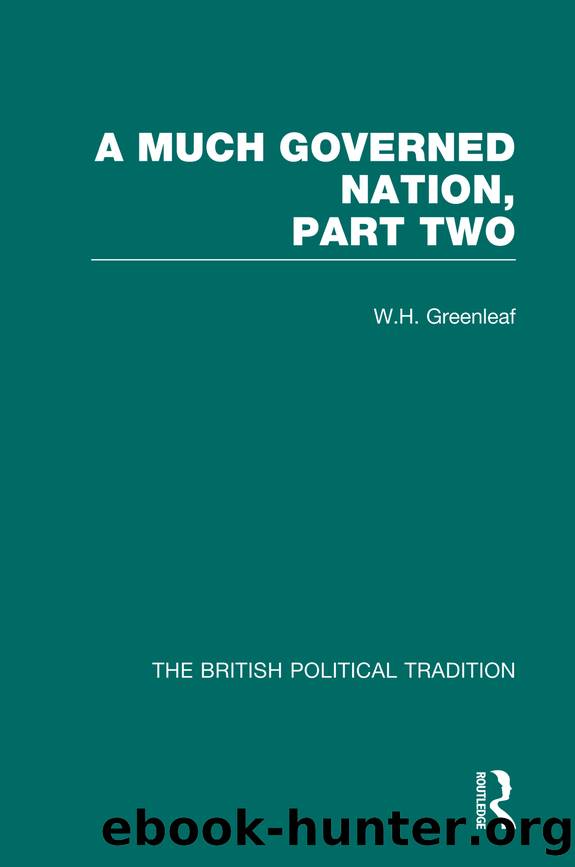Much Governed Nation Pt2 by W. H. Greenleaf

Author:W. H. Greenleaf [Greenleaf, W. H.]
Language: eng
Format: epub
Tags: Reference, Political Science, General
ISBN: 9781135033583
Google: TrEJBAAAQBAJ
Goodreads: 22829818
Publisher: Routledge
Published: 1983-01-01T00:00:00+00:00
The restriction of scrutiny
It has long been urged that Parliament should be regarded, not so much as a legislative machine, but as a body mainly concerned to discuss general issues and particular grievances, to act, that is, as 'a grand forum of debate' and political education and as a means of redressing errors of administration.135 Libertarians, with their hostility to the growth of state intervention and the increase of legislation entailed, will certainly tend to see matters in this way and to emphasize the critical and controlling function of the assembly.136 Of course it used to be the case that opposition to, and criticism of, the executive was the function of Parliament as a whole. But this is no longer so, given the emergence of the modern party-based government with, usually, its hold over a majority in the Commons. The result is that the function of opposition is in most circumstances formally confined to the opposition party (or parties) so-called.137 None the less the wider role of discussion and scrutiny is one in which all unofficial members may be involved. And, as with legislation, the story of the past hundred years or so is one, on the whole, of increasing restriction of opportunities for inquiry at a time when the occasions for it are increasing because of the expanding scope of state action. This is not to say at all that there are not numerous instances of successful pressure being exerted on ministers to get them to change or withdraw a particular policy or part of it, of a decision being altered, or of government being halted in its tracks or even overthrown. But the secular tendency in this respect is hardly to be doubted and has often been observed. George told the Procedure Committee in 1931 that 'Parliament has really no control over the Executive; it is a pure fiction'. A little earlier, the same sort of opinion had been expressed (albeit in a different way) by an official in close touch with the Parliamentary scene. Sir William Graham-Harrison, the Parliamentary Counsel to the Treasury, said (in his evidence to the Committee on Ministers' Powers) that he felt ministers did not then 'care so much about the opinion of the House as fifty or sixty years ago. That is the impression I have from looking on': and he had been a close professional observer since 1903.138 Then, only a short while ago, the Commons itself debated the matter. The general level of discussion was hardly impressive to say the least; and it seems the chamber was not well attended on the occasion. But what is interesting is the formal and unopposed recognition of the problem. The terms of the resolution approved were:
That this House notes with concern that the degree of Parliamentary control over the Executive has diminished and is diminishing; believes the opportunities for regular supervision of the actions of the Executive by Parliament are inadequate in the modern context; is concerned with the implications for the Constitution
Download
This site does not store any files on its server. We only index and link to content provided by other sites. Please contact the content providers to delete copyright contents if any and email us, we'll remove relevant links or contents immediately.
Spare by Prince Harry The Duke of Sussex(5197)
Navigation and Map Reading by K Andrew(5156)
Tuesdays with Morrie by Mitch Albom(4784)
Machine Learning at Scale with H2O by Gregory Keys | David Whiting(4313)
Cracking the GRE Premium Edition with 6 Practice Tests, 2015 (Graduate School Test Preparation) by Princeton Review(4293)
Never by Ken Follett(3956)
Goodbye Paradise(3810)
What It Really Takes to Get Into Ivy League and Other Highly Selective Colleges by Hughes Chuck(3760)
Fairy Tale by Stephen King(3396)
Harry Potter and the Prisoner of Azkaban (Book 3) by J. K. Rowling(3360)
Pledged by Alexandra Robbins(3178)
Kick Ass in College: Highest Rated "How to Study in College" Book | 77 Ninja Study Skills Tips and Career Strategies | Motivational for College Students: A Guerrilla Guide to College Success by Fox Gunnar(3129)
Reminders of Him: A Novel by Colleen Hoover(3116)
A Dictionary of Sociology by Unknown(3085)
Sapiens and Homo Deus by Yuval Noah Harari(3071)
The Social Psychology of Inequality by Unknown(3031)
Graduate Admissions Essays, Fourth Edition: Write Your Way into the Graduate School of Your Choice (Graduate Admissions Essays: Write Your Way Into the) by Asher Donald(2921)
Will by Will Smith(2919)
Zero to Make by David Lang(2784)
